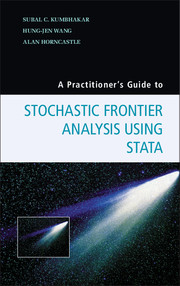Book contents
- Frontmatter
- Dedication
- Contents
- Preface
- PART I GENERAL INFORMATION
- PART II SINGLE EQUATION APPROACH: PRODUCTION, COST, AND PROFIT
- PART III SYSTEM MODELS WITH CROSS-SECTIONAL DATA
- PART IV THE PRIMAL APPROACH
- 8 Estimation of Technical and Allocative Efficiency in Cost Frontier Models Using System Models with Cross-Sectional Data: A Primal System Approach
- 9 Estimation of Technical and Allocative Efficiency in Profit Frontier Models Using System Models with Cross-Sectional Data: A Primal System Approach
- PART V SINGLE EQUATION APPROACH WITH PANEL DATA
- PART VI LOOKING AHEAD
- APPENDIX
- A Deriving the Likelihood Functions of Single Equation Frontier Models
- B Deriving the Efficiency Estimates
- C Deriving Confidence Intervals
- D Bootstrapping Standard Errors of Marginal Effects on Inefficiency
- E Software and Estimation Commands
- Bibliography
- Index
8 - Estimation of Technical and Allocative Efficiency in Cost Frontier Models Using System Models with Cross-Sectional Data: A Primal System Approach
Published online by Cambridge University Press: 05 February 2015
- Frontmatter
- Dedication
- Contents
- Preface
- PART I GENERAL INFORMATION
- PART II SINGLE EQUATION APPROACH: PRODUCTION, COST, AND PROFIT
- PART III SYSTEM MODELS WITH CROSS-SECTIONAL DATA
- PART IV THE PRIMAL APPROACH
- 8 Estimation of Technical and Allocative Efficiency in Cost Frontier Models Using System Models with Cross-Sectional Data: A Primal System Approach
- 9 Estimation of Technical and Allocative Efficiency in Profit Frontier Models Using System Models with Cross-Sectional Data: A Primal System Approach
- PART V SINGLE EQUATION APPROACH WITH PANEL DATA
- PART VI LOOKING AHEAD
- APPENDIX
- A Deriving the Likelihood Functions of Single Equation Frontier Models
- B Deriving the Efficiency Estimates
- C Deriving Confidence Intervals
- D Bootstrapping Standard Errors of Marginal Effects on Inefficiency
- E Software and Estimation Commands
- Bibliography
- Index
Summary
Introduction
Until now, we have assumed that firms only incur technical inefficiency in the production of output, and the allocation of inputs is either at the most efficient level or inputs are exogenously given. If inputs are exogenously given, one may not address allocative inefficiency simply because the input allocation problem is assumed away. By contrast, if inputs are endogenous, then allocation decisions using some economic behavior have to be made. Such decisions may or may not be optimal. If the allocation is nonoptimal, then the producer is allocatively inefficient. In either case, endogeneity of inputs has to be taken into account in the model.
In a cost minimizing framework, input allocation is optimal if producers allocate inputs in such a way that input price ratios equal the ratio of their marginal products. In such a case, actual cost differs from the optimal cost (barring the noise term) due to technical inefficiency. On the other hand, if input allocation is nonoptimal, cost will be higher because of both technical and allocative inefficiency. In this chapter, we examine the impact of both technical and allocative inefficiency on costs, assuming that output and input prices are exogenous and the level of inputs are the choice variables (i.e., the goal is to use inputs to minimize cost for a given level of output and input prices).
In this setting, we are able to extend the questions we first set out in Chapter 4. In addition to examining whether, and by how much, a firm can reduce its costs, we are also able to identify how much of this cost reduction can be achieved through improvements in technical efficiency and how much can be achieved through an optimal mix of inputs.
For instance, we can reconsider the health care questions first asked in Chapter 4, namely, how much lower could the cost of treatment be at certain hospitals while still treating the same number of patients for the same level of care and how can this be achieved?
- Type
- Chapter
- Information
- Publisher: Cambridge University PressPrint publication year: 2015



